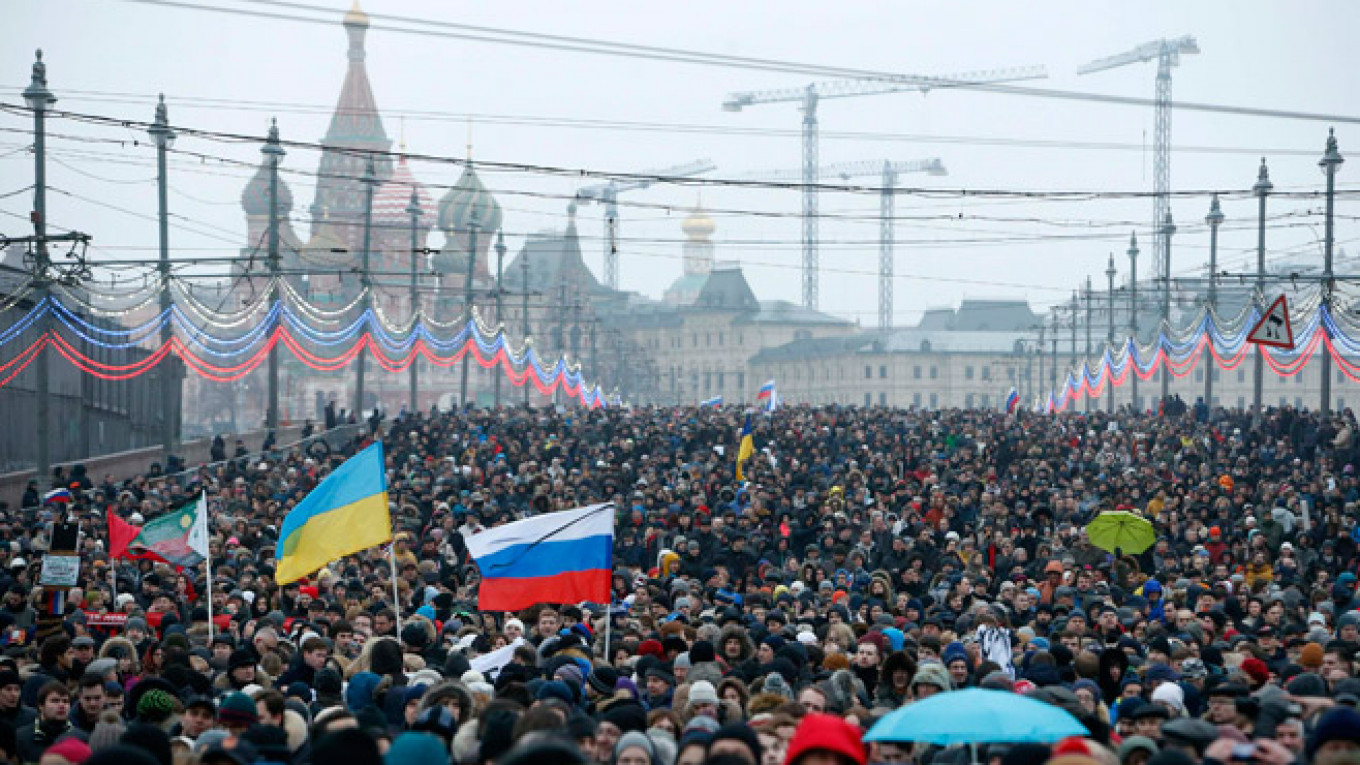Kremlin critic Boris Nemtsov's murder is unlikely to unite Russia's scattered opposition factions, whose discordant ideologies have consistently prevented their consolidation into a coherent political force to be reckoned with, analysts said Monday.
The multicolored flags of various opposition parties flew high above Sunday's silent march to mourn the death of Nemtsov, who was gunned down Friday night on Moscow's Bolshoi Moskvoretsky Bridge, under the shadow of the Kremlin walls. The assassination of one of President Vladimir Putin's most virulent critics has sent shockwaves through the political establishment and the opposition, some of its members expressing hope that the tragedy would help reconcile the differences between opposition groups.
"The death of Boris Nemtsov needs to unite the opposition even more," former opposition politician Gennady Gudkov, one of the march's organizers, told The Moscow Times on Sunday.
But Gudkov's call for unity is unlikely to be fulfilled, according to Alexander Pozhalov, research director at the Moscow-based Institute of Socio-Economic and Political Research.
Russia's multifarious opposition parties — including Alexei Navalny's Progress Party and Sergei Mitrokhin's Yabloko party — are headed by what Pozhalov referred to as ambitious "mini-leaders." These individuals, who present themselves as capable leaders in their own right, often struggle to agree on such crucial matters as the standards that elections should be held to, or how best to organize general opposition protests.
"One of Nemtsov's roles within the opposition was that of moderator," Pozhalov said. "He helped different opposition forces come together. He was a professional politician [having served at various times as a regional governor, deputy prime minister and a lawmaker] with loads of experience, much more than any other current opposition leader."
In the absence of such a figure, it seems that the non-systemic opposition — parties that are not represented in the State Duma — will have to search for a new moderator. But the odds of finding a figure capable of balancing the demands of all the opposition forces are slim, according to analysts.
The Nationalism Question
Some observers have speculated that opposition firebrand Alexei Navalny — a former Moscow mayoral candidate who was handed a three-and-a-half year suspended sentence in December on embezzlement charges seen by critics as politically motivated — could rise above internal discord and bring Russia's many opposition forces under one umbrella.
But the anti-corruption crusader, who was slapped last month with a 15-day prison sentence for distributing fliers to mobilize protesters for a planned opposition march, has advanced a nationalist ideology critical of the presence in Russia of foreign workers from the former Soviet republics. While such notions resonate with the nationalist factions in the opposition, they are at odds with many liberals critical of Kremlin policies.
Navalny is a regular participant in Moscow's annual Russian March, a nationalist-themed gathering known to deteriorate into a stomping ground for xenophobes. He makes liberal use of racial slurs when discussing Russia's large migrant populations from Central Asia and the Caucasus, a feature that has alienated him from an older generation of liberal opposition leaders, according to Pozhalov.
"Navalny's nationalist statements do not resonate with the 'old liberals', a group in which I include Nemtsov, [former Prime Minister Mikhail] Kasyanov and [former Duma lawmaker] Vladimir Ryzhkov," he said. "They fear that these expressions of nationalism would translate into policies. Divergences on this question have made it difficult for one figure to emerge to lead the opposition as a whole."
Track Record of Failure
Non-systemic opposition parties, both liberal and nationalist, have repeatedly tried to unite and form a cohesive political block. The current threshold for political parties to be represented in the Duma stands at five percent of the popular vote, a bar that was lowered from seven percent in 2011.
Opposition party Yabloko fared the best among the non-systemic opposition parties, earning 3.43 percent of the vote, a laudable result, but one that still landed below the required threshold.
An umbrella coalition of opposition forces known as Another Russia brought together a variety of liberals, nationalists and left-wing sympathizers in 2006. Headed by former world chess master and famed Kremlin opponent Garry Kasparov and Eduard Limonov, former leader of the banned National Bolshevik Party, the coalition fell apart in 2010 because of its members' disparate views. The leading members of the coalition blamed each other for having brought about its demise.
Other informal alliances among opposition parties — including the "For Fair Elections" movement in 2011, which advocated for transparent Duma elections — failed to evolve into larger, more coherent structures.
There in fact have been no successful attempts at forming a long-term opposition coalition in the post-Soviet era, political analysts have noted.
Nemtsov had called in November for opposition parties to come together to "coordinate protest activity [and] human rights advocacy and to coordinate [their] activities for the 2016 Duma elections and the 2018 presidential elections," the Interfax news agency reported at the time.
"We have to realize that we have no other choice," Interfax quoted Nemtsov as saying. "We need to forget our personal differences and grudges now."
Grim Prospects
According to certain political analysts, including Alexei Makarkin of the Center for Political Technologies, opposition forces have failed to unite because of the absence of a concrete goal they strive to achieve. A trend toward criticizing the state while failing to present any tangible political platform or agenda, combined with low popularity ratings, have smothered overarching calls for unity.
"They can talk about uniting the opposition, but for what sake?" Makarkin said. "They have low popularity ratings, no prospects, no tasks at hand."
According to a survey published Friday by the Levada Center, an independent pollster, a mere 15 percent of Russians sympathized with Nemtsov, Navalny and other members of the non-systemic opposition. The poll, conducted among 1,600 respondents across Russia with a margin of error not exceeding 3.4 percent, found that 68 percent of the population had no patience for them.
Beyond internal conflicts and a lack of solid leadership, the opposition also faces serious obstacles created by the Kremlin, which has restricted its ability to gain supporters, said Dmitry Oreshkin, the head of the Mercator political research group.
"In a situation in which a rubber-stamp parliament exists, when the state media portrays opposition politicians as national enemies, it is impossible for the opposition to become structured and organized," he said. "Nemtsov was killed. Opposition politics are being killed as well."
Contact the author at g.tetraultfarber@imedia.ru
A Message from The Moscow Times:
Dear readers,
We are facing unprecedented challenges. Russia's Prosecutor General's Office has designated The Moscow Times as an "undesirable" organization, criminalizing our work and putting our staff at risk of prosecution. This follows our earlier unjust labeling as a "foreign agent."
These actions are direct attempts to silence independent journalism in Russia. The authorities claim our work "discredits the decisions of the Russian leadership." We see things differently: we strive to provide accurate, unbiased reporting on Russia.
We, the journalists of The Moscow Times, refuse to be silenced. But to continue our work, we need your help.
Your support, no matter how small, makes a world of difference. If you can, please support us monthly starting from just $2. It's quick to set up, and every contribution makes a significant impact.
By supporting The Moscow Times, you're defending open, independent journalism in the face of repression. Thank you for standing with us.
Remind me later.





